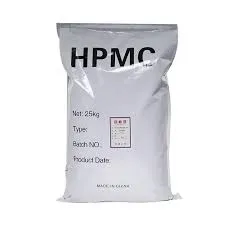
Aug . 01, 2024 04:01 Back to list
Exploring the Applications and Benefits of Hydroxy Methyl Cellulose in Modern Industries
The Importance of Hydroxy Methyl Cellulose in Modern Applications
Hydroxy Methyl Cellulose (HMC) is a non-ionic, water-soluble polymer derived from cellulose, a natural polymer found abundantly in the cell walls of plants. Due to its unique properties, HMC has become an essential ingredient in various industries, including pharmaceuticals, food, cosmetics, and construction.
One of the primary characteristics of HMC is its ability to form gel-like solutions when mixed with water. This property makes it an excellent thickening agent, which is invaluable in many formulations. In the pharmaceutical sector, HMC plays a crucial role in drug formulation, especially in controlled-release systems. It helps in modifying the release rates of active ingredients, ensuring that medications are delivered to the bloodstream in a gradual manner. This not only enhances the efficacy of drugs but also minimizes side effects, providing patients with a better therapeutic experience.
The Importance of Hydroxy Methyl Cellulose in Modern Applications
The cosmetic and personal care industry also benefits significantly from the inclusion of HMC in formulations. Its film-forming abilities and moisture retention properties make it an ideal ingredient for skin creams, lotions, and hair care products. HMC helps improve the spreadability and overall sensory experience of these products, resulting in enhanced consumer satisfaction. Furthermore, it acts as a stabilizer in emulsions, ensuring that the products maintain their intended consistency over time.
hydroxy methyl cellulose

In the construction sector, HMC is increasingly utilized in the formulation of construction materials such as cement, mortar, and tile adhesives. Its water-retention capabilities help improve workability, allowing for better adhesion and reduced cracking in finished products. As the construction industry focuses on sustainable building practices, HMC also contributes to the performance of eco-friendly materials, making it a valuable component in modern construction technologies.
Additionally, the versatility of HMC extends to the realm of pharmaceuticals beyond drug formulation. It is often employed in the production of film coatings for tablets and capsules, ensuring the stability and release of the active ingredients within. The controlled dissolution of these coatings makes it possible to create dosage forms that dissolve at specific sites within the gastrointestinal tract, thereby enhancing the bioavailability of certain drugs.
As research continues to explore the potential applications of HMC, new avenues are being opened up, particularly in biotechnology and tissue engineering. Its biocompatibility positions it as a suitable candidate for use in various biomedical applications, including scaffolds for cell growth and delivery systems for therapeutic agents.
In conclusion, Hydroxy Methyl Cellulose is a multifunctional polymer with a wide range of applications across various industries. Its unique properties facilitate improvements in the formulation and stability of products, enhancing the overall consumer experience. As industries continue to innovate and adapt to changing consumer needs, the role of HMC is likely to expand, paving the way for new and exciting applications in the future.
-
Versatile Hpmc Uses in Different Industries
NewsJun.19,2025
-
Redispersible Powder's Role in Enhancing Durability of Construction Products
NewsJun.19,2025
-
Hydroxyethyl Cellulose Applications Driving Green Industrial Processes
NewsJun.19,2025
-
Exploring Different Redispersible Polymer Powder
NewsJun.19,2025
-
Choosing the Right Mortar Bonding Agent
NewsJun.19,2025
-
Applications and Significance of China Hpmc in Modern Industries
NewsJun.19,2025







